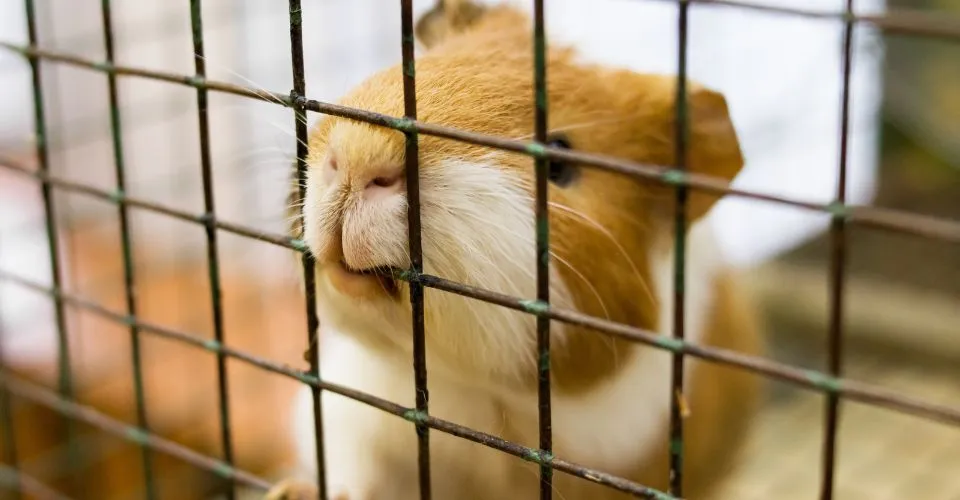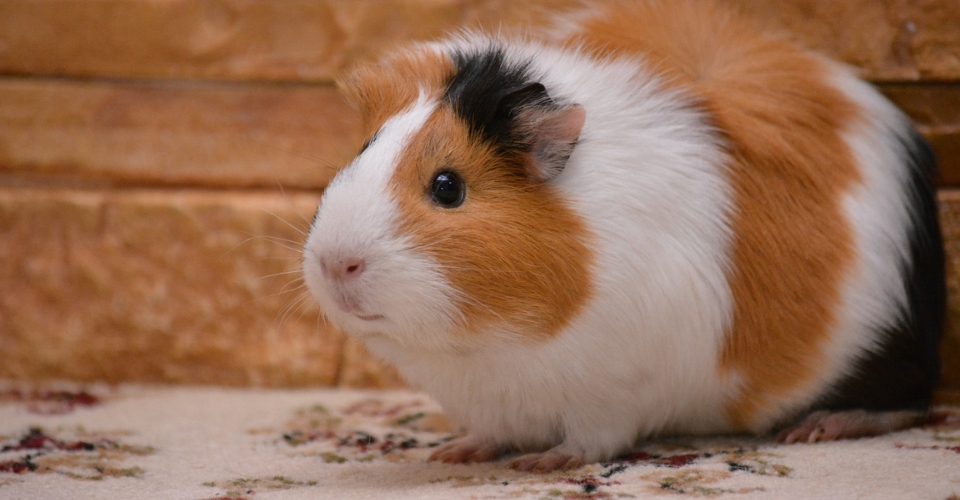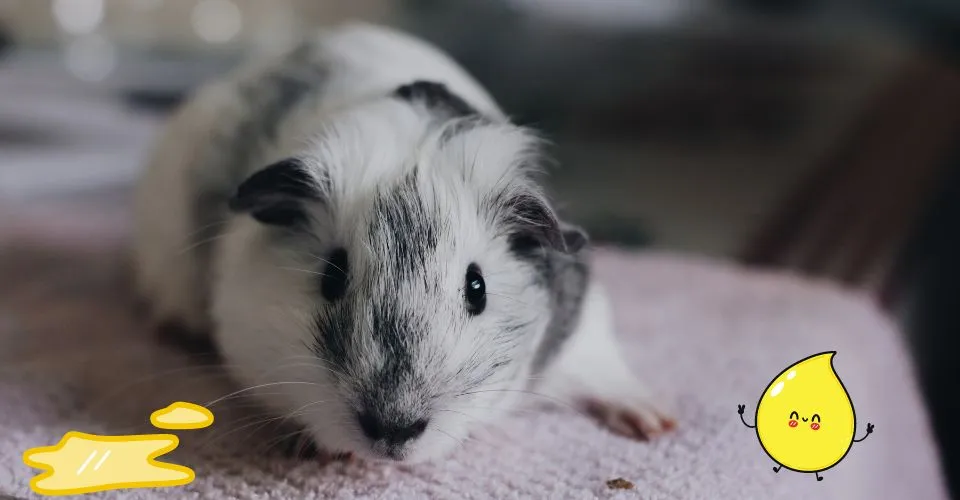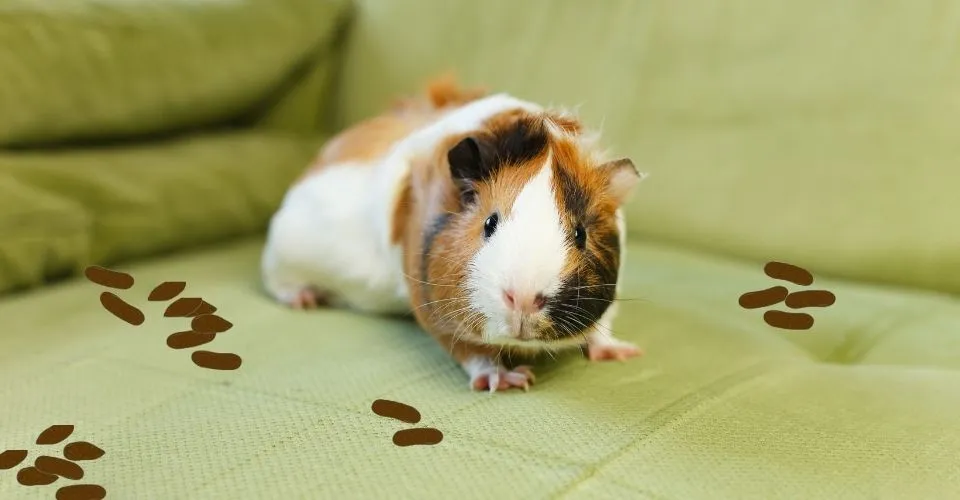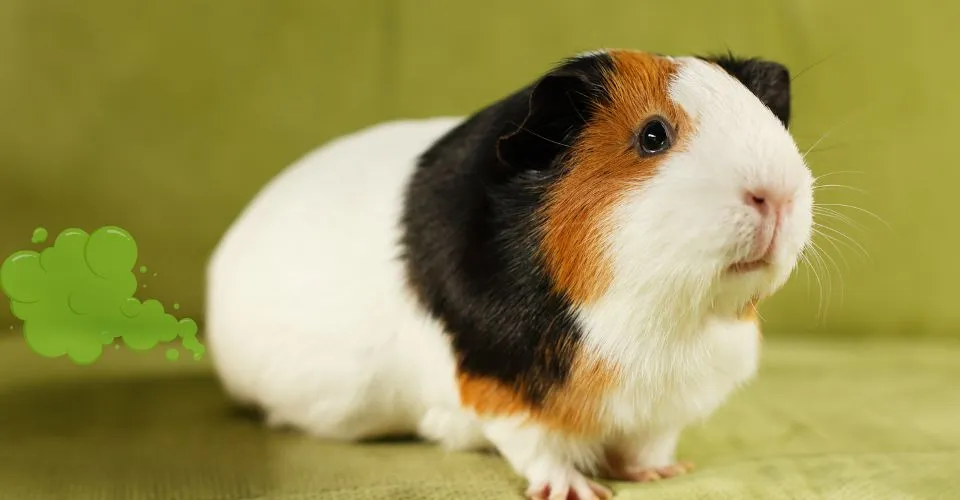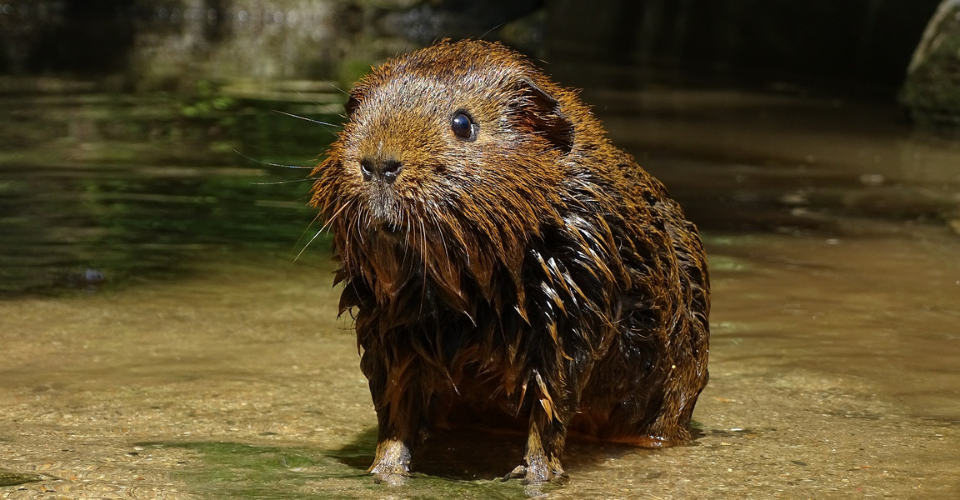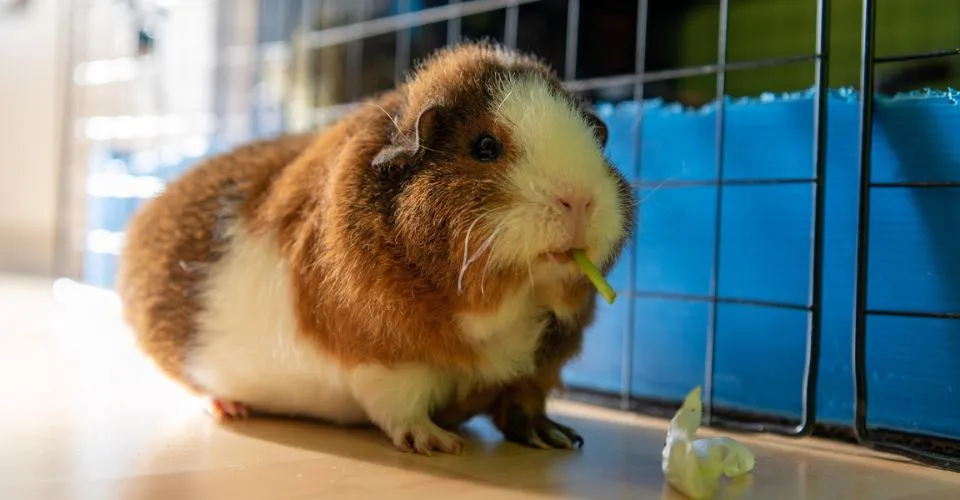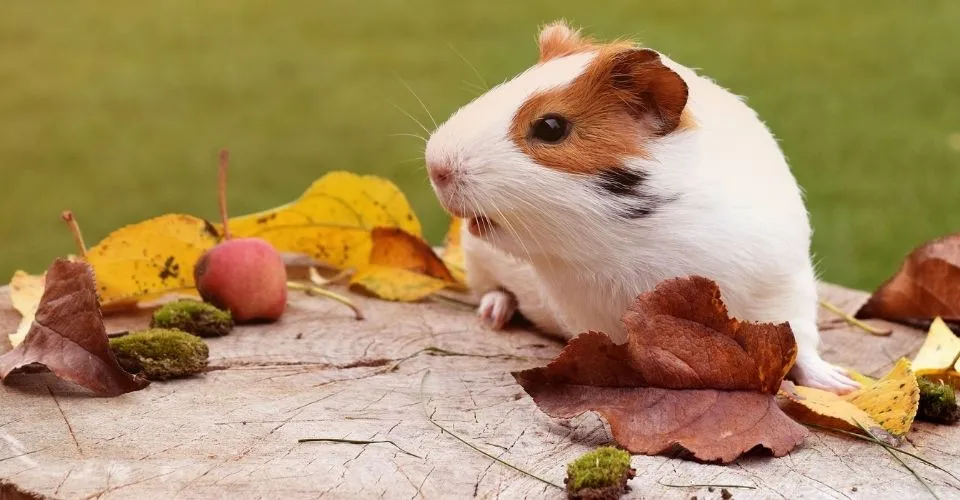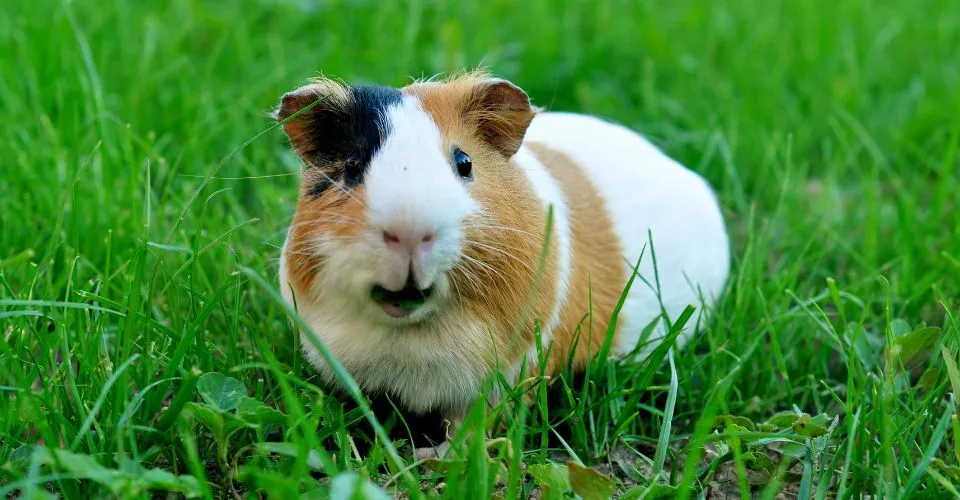Watching your guinea pig biting its cage or chewing on its hutch you may wonder why guinea pigs bite their cage. What can you do about it? You might also be concerned about the health issues that may develop due to all that chewing on a wooden hutch or a painted metallic cage.
Well, stop worrying. First, know that you are not alone, every other guinea pig owner complains about their guinea pigs biting the cage. Second, in this blog, we are not only going to discuss the underlying reasons but also what you can do about it.
But before we continue, know that guinea pigs need to chew as much as they do, to keep the growth of their always-growing teeth in check. Actually, guinea pigs’ teeth continue growing throughout their lifetime. Chewing on hay and other stuff wears down their teeth and helps maintain the ideal guinea pig teeth size of 1.5cm (0.5 inches). So, chewing on their cage could mean that guinea pig does not have other stuff to chew on to wear down their teeth. Or perhaps, they like the feeling of metallic bars.
You do not need to worry too much or rush your guinea pig to a cavy-savvy veterinarian for biting its cage. However, if your piglet seems to be obsessed with the metallic bars of the cage or wooden hutch, you need to thoroughly investigate this pica.
| Why Do Guinea Pigs Bite Cage | What Can You Do About It |
| Trim their teeth | Ensure a constant supply of hay and take to the vet if teeth are overgrown |
| Boredom | Enrich guinea pig setup with toys; try music; make changes to the setup |
| Loneliness | Get your guinea pig a cagemate |
| Unfriendly Cagemate | Ensure the cagemate is not bullying |
| Seeking your attention | Offer due attention to your guinea pig |
| Want to explore the floor | Regularly take your guinea pig out of its cage for the floor time |
| Stress | Ensure there is no looming threat nearby; the environment should be calm and quiet |
| Cage is small | Get your guinea pig the largest cage you can afford |
| Hunger | Feed your guinea pig; offer healthy chews |
Why Do Guinea Pigs Bite Cages? What Should You Do?
While it is fairly common for guinea pigs to chew on whatever comes their way, if your guinea pig seems to be obsessed with the cage bars, or wooden hutch, there could be an underlying problem.
Guinea pigs bite their cage to wear down their teeth when they have nothing else to chew on. Guinea pig bites their cage when they are bored, hungry, stressed, lonely, or seeking their owner’s attention. They may also bite their cage if it is too small or if their cagemate is unfriendly.
Below, we have discussed what could be the underlying causes of your guinea pig biting its cage and what you can do about it.
1. Guinea Pigs Is Trimming Its Teeth
Guinea pigs have open-rooted teeth, which means that they will continue growing throughout their lifetime. While munching on hay and guinea pig pellets helps guinea pigs wear down their teeth and keep them to a healthy length of about 0.5 inches. But when guinea pigs either don’t have ample hay to munch on or for some other reason, their teeth grow to an unhealthy size, guinea pigs’ teeth need to be trimmed. This is the reason that when guinea pigs don’t have a constant supply of hay to munch on, they may start biting their cage, to wear down their teeth. Overgrown teeth are unhealthy and painful to guinea pigs.
| What Can You Do About It? Ensure that your guinea pig has constant access to quality hay. Besides hay, you should also offer guinea pig pellets to your fur babies. You may also want to offer them chew toys to bite on. Mostly guinea pigs only start biting their cage, when they have nothing else to munch on. |
2. Guinea Pig Is Bored
Guinea pigs are smart and active little creatures. They tend to get bored pretty easily. And when bored, guinea pigs develop behavioral issues such as biting their cage.
| What Can You Do About It? If your guinea pig is chewing out of boredom, you should get them new toys—chew toys. You may also want to change the guinea pig cage setup unless you have a lethal white guinea pig—they are almost always blind and deaf and would have trouble navigating through a changed setup. You can also try to play your guinea pig some music—guinea pigs like soft and calming music. You can also add new hides, tunnels, and toys to your guinea pig’s cage. |
3. Guinea Pig Is Alone
Guinea pigs are social creatures. They usually live in herds. This is the reason that guinea pig owners are strongly advised to keep them in pairs. While you can keep a single guinea pig, you will have to keep him engaged with toys, prolonged floor times, and interactive sessions with you. But even if you do all this, guinea pigs might feel alone and thus develop behavioral issues like biting the cage.
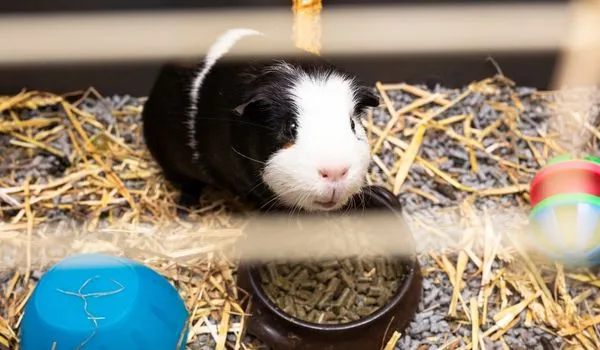
| What Can You Do About It? If you had a pair of guinea pigs and you just lost one and the remaining guinea pig started to chew on the cage, it is because he is missing his cage mate. Besides that, guinea pigs are social creatures and you should never just have one guinea pig. While you can offer your guinea pig toys, chewing on the cage would probably only stop when you bring him a new cagemate. |
4. Guinea Pig Cage Mate Is Unfriendly
Where living alone could be the reason underlying the guinea pig chewing on the cage, living with an unfriendly or perhaps a bully cagemate could also make guinea pigs bite the cage. When being bullied by their cagemate, the victim guinea pig may bite the cage bars to get their owners’ attention.
| What Can You Do About It? If your guinea pigs seem not to be getting along, you should offer them separate water bottles, hay feeders, and toys. If the troublemaker is still bullying other guinea pigs, you may want to separate him from other guinea pigs until he learns to behave. When introducing a new guinea pig to your herd, you may want to closely observe if he is getting along with other guinea pigs. The introduction of a new guinea pig often leads to dominance feuds. |
5. Guinea Pig wants Your attention
Guinea pigs recognize their owners. Not only that but guinea pigs also like and love their owners. While at first guinea pigs may be reluctant to get held or even eat from their owner’s hand, once they get comfortable, guinea pigs are always looking forward to their handling sessions and floor time. If you have been busy at work and did not give your guinea pigs the due attention, they may start biting the cage, just to get your attention. Guinea pigs seeking your attention may also produce a variety of noises like purring, chirping, squeaking, etc. Guinea pigs are not overly noisy but when seeking the attention of their owners, they could be huge chatterboxes.
| What Can You Do About It? If your guinea pig is chewing on its cage to seek your attention, then he will immediately stop chewing on the cage as you start giving him the due attention. Just keep in mind that you don’t want to condition biting on the cage with a petting session and floor time. So, you may ignore when your guinea pig is biting on the cage and only offer him your attention when he is being a good cavy citizen. |
6. Guinea Pig Wants Floor Time
Floor time and exercise are essential for guinea pigs to maintain their mental and physical health. Guinea pigs need a lot of floor time to satiate their urges to explore, forage, run around, and chew on things. When guinea pigs don’t get ample floor time, they may start to chew on the metallic cage bars, trying to escape the floor time.
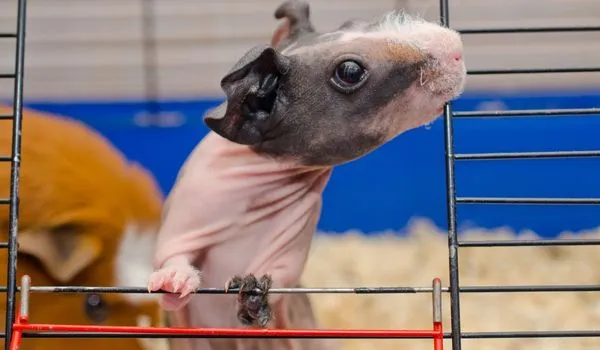
| What Can You Do About It? Take your guinea pig out of its cage regularly and allow him to explore a cavy-safe room and quench his thirst for exploration. Exploring and running around during floor time, your guinea pig would healthily expend his energy and would probably stop biting the cage. |
7. Guinea Pig Is Stressed
Biting the cage could also be a sign of stress and anxiety. Besides biting the cage, stressed guinea pigs may also run around in the cage. In the wild guinea pigs are prey animals and they easily get stressed. For instance, watching a cat or dog lurking around, or hearing a sudden loud noise could stress your guinea pig, which may result in the guinea pig biting the cage.
| What Can You Do About It? You need to identify the cause of stress and remove it. You should provide your guinea pig with a calm and quiet environment. If being around strangers makes your guinea pigs stressed, you should move the cage into a quiet room, where traffic is minimum and less noise. |
8. Guinea Pig Cage Is Small
Guinea pigs need to be kept in a large cage, wherein they have ample space to roam around. So, if you are housing your guinea pig in a small cage, they are inevitably going to bite the cage, trying to break out. Guinea pigs do not climb or jump and solely rely on the floor space. So they are going to need a roomier cage, wherein they could run around and exercise.
| What Can You Do About It? When shopping for a guinea pig cage, always go for the largest you can afford. At minimum cage for two guinea pigs should be 7.5 square feet. Anything less than that may cause your guinea pig to chew the cage. For more information on housing guinea pigs, you can check out the humane society directions. |
9. Guinea Pig Is Hungry
Guinea pigs may chew on their cage if they are hungry. They bite metallic bars to compensate for the nutritional deficiencies or perhaps to get the attention of their loving owners and remind them that they forgot to feed them today. A hungry guinea pig may bite you if you try to handle him instead of serving him his meal.
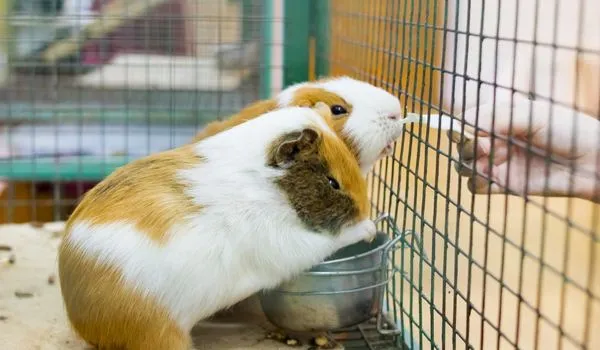
| What Can You Do About It? If your guinea pig is chewing on the cage of the hutch, you should ask yourself, could your guinea pig be hungry? If you have forgotten to feed your guinea pig his meal on time, you should immediately serve him quality guinea pig pellets and check if there is hay in the hay feeder. |
Frequently Asked Questions
As guinea pigs biting cages is very common, guinea pig owners have a lot of concerns about this odd behavior. Below we have tried to address all the questions related to guinea pigs biting cage bars.
Is It Ok for Guinea Pigs to Chew On Their Cage Bars?
Given the ever-growing teeth of guinea pigs, it is quite common for guinea pigs to chew on their cage bars. While guinea pig biting cage bars every now and then is nothing to worry about, if your guinea pig seems to be obsessed with metallic bars, you need to investigate the underlying reasons.
Why Do Guinea Pigs Chew On Their Wooden Hutch?
Guinea pigs probably chew on their wooden hutch for the same reasons they chew on the metallic bars of the cage. It might be that they like the taste of the wood or they don’t like its small size. They could be hungry, longing for floor time, or just seeking your attention.
Can Guinea Pigs Chew On Wood?
It is perfectly fine for guinea pigs to chew on wood. Actually, in the wild, guinea pigs used to chew on wood to wear down their teeth. But you should keep in mind that aromatic woods like pine, redwood, and eucalyptus, are not safe for guinea pigs to chew on.
Guinea pigs love twigs from fruit trees. But before you give twigs to your guinea pigs, ensure that they are not sprayed with any pesticides, insecticides, or any other chemical.
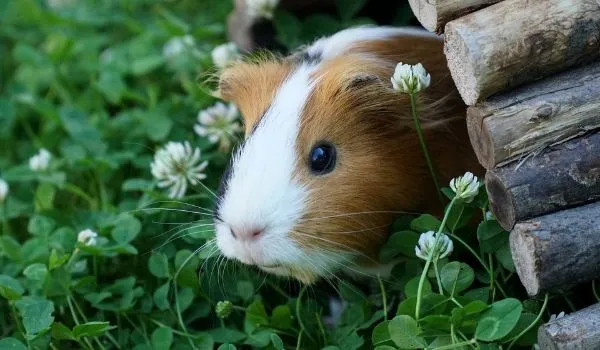
Can Guinea Pigs Chew On Plastic?
While there is no serious risk associated with guinea pigs chewing on plastic, it should be discouraged.
It is not harmful to guinea pigs as they do not bite off larger pieces of it, which could pose a serious choking hazard or an intestinal blockage. However, as plastic is not good for our fur babies, most guinea pig toy manufacturers avoid using plastic.
Guinea pig pee pads often have a layer of plastic to keep the guinea pig pee from seeping out. Guinea pig eating pads are usually chewing on that layer of plastic. This is usually nothing to worry about, but you should discourage and work around making plastic inaccessible to your guinea pigs.
What Can You Give Your Guinea Pig to Chew On?
While our guinea pigs would bite and chew on whatever comes their way, as responsible guinea pig owners, we should always make sure that whatever it is that we are offering them is safe for them. Besides asking Google, you should run new additions to the guinea pig diet by your vet. That said, here are a few things that are safe for guinea pigs to munch on.
- Hay sticks
- Grass mats
- Chew toys
- Grass ball
- Cardboard
- Veggies and fruits
- Paper rolls
